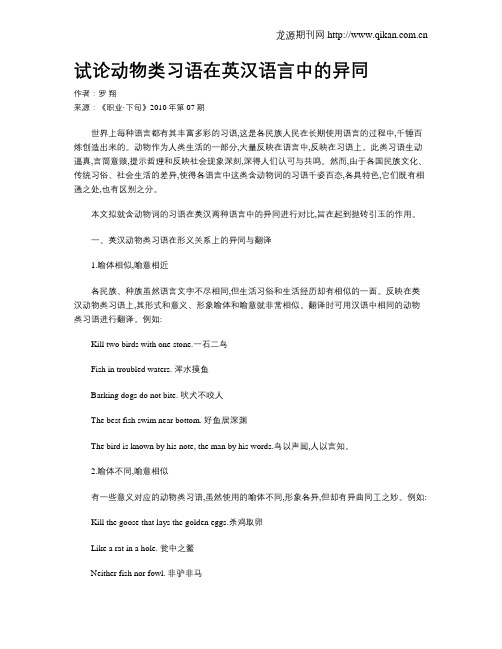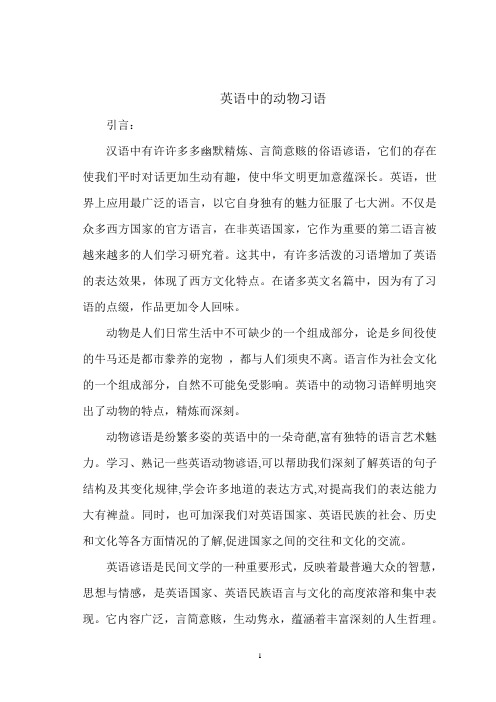英汉对比之动物习语
- 格式:doc
- 大小:28.50 KB
- 文档页数:3

世界各民族语言中有大量有关动物的习俗语和谚语,这些语言背后蕴藏着深厚的文化积淀,反映不同民族对动物相同或不同的情感态度。
文章在前期对中国传统文化中十二生肖动物及其它动物词语研究的基础上,主要对汉语和英语语言中有关动物的成语、习俗语和谚语进行对比分析,从有关动物词语的字面意义出发,探讨挖掘他们的比喻意义、联想意义,寻找出英汉语言中动物词语的共同点和差异,揭示两种语言中动物词语在语义表达上的主要特点。
指出英汉语言中包含动物名称的词语语义形成的基础,两种语言中运用动物词语进行语义表达的对等性特点,以及这些包含动物的词语所蕴涵的文化特征。
动物是自然界的一部分,是人类生活中密切相关的重要组成部分。
世界各民族语言中出现了大量有关动物的成语、习俗语、格言等词语,它们反映了不同民族对动物的认识,体现人们对动物大致相同或不同的情感态度,因而这些语言中蕴涵着丰富的文化内涵。
笔者以中华民族传统的的十二生肖动物为切入点,通过查阅词典、文献资料等,搜集整理了大量含有动物名称的相关词语,在进一步分析对比的基础上,探讨这些词语所表达的各种意义,进而挖掘它们隐含的文化内涵。
一、动物词语的语义基础之所以在汉语和英语中人们借助动物构成各种语言形式,表达丰富的语言意义,是和其生活地域、生活习性、人与自然关系、文化价值观等因素有关联,有着深厚的语义形成基础。
(一)根据形体、生活习性特征表达的语义英汉语言都有根据动物的形体生理特点及生活习性所形成的词语。
它们形象逼真地反映了这些动物的生活规律,以感性认识为基础,从而引申出一定的语言意义,例如,蛇(snake)是一种爬行动物,体形柔软易弯曲,在行走时,蜿蜒曲折前行,因而英汉语言中都有“蛇行(snake its way through)”。
另外蛇能分泌毒液,隐匿于草丛中,因而有“阴险、狠毒”的联想意义,英语中有“a snake in the grass”,比喻伪装成朋友的阴险之人。
又如,鸡(cock)的生活习性之一是清早鸣叫,因而汉语中有“闻鸡起舞、雄鸡一唱天下白”等词语,英语中有“cock-crow(黎明)”等词语。


试论动物类习语在英汉语言中的异同作者:罗翔来源:《职业·下旬》2010年第07期世界上每种语言都有其丰富多彩的习语,这是各民族人民在长期使用语言的过程中,千锤百炼创造出来的。
动物作为人类生活的一部分,大量反映在语言中,反映在习语上。
此类习语生动逼真,言简意赅,提示哲理和反映社会现象深刻,深得人们认可与共鸣。
然而,由于各国民族文化、传统习俗、社会生活的差异,使得各语言中这类含动物词的习语千姿百态,各具特色,它们既有相通之处,也有区别之分。
本文拟就含动物词的习语在英汉两种语言中的异同进行对比,旨在起到抛砖引玉的作用。
一、英汉动物类习语在形义关系上的异同与翻译1.喻体相似,喻意相近各民族、种族虽然语言文字不尽相同,但生活习俗和生活经历却有相似的一面。
反映在英汉动物类习语上,其形式和意义、形象喻体和喻意就非常相似。
翻译时可用汉语中相同的动物类习语进行翻译。
例如:Kill two birds with one stone.一石二鸟Fish in troubled waters. 浑水摸鱼Barking dogs do not bite. 吠犬不咬人The best fish swim near bottom. 好鱼居深渊The bird is known by his note, the man by his words.鸟以声闻,人以言知。
2.喻体不同,喻意相似有一些意义对应的动物类习语,虽然使用的喻体不同,形象各异,但却有异曲同工之妙。
例如:Kill the goose that lays the golden eggs.杀鸡取卵Like a rat in a hole. 瓮中之鳖Neither fish nor fowl. 非驴非马You cannot make a crab walk straight.是狼改不了吃肉,是狗改不了吃屎。
Dog doesn’t eat dog . 虎毒不食子Like a cat on hot bricks. 像热锅上的蚂蚁When the cat is away, the mice will play.山中无老虎,猴子称大王。

英语中的动物习语引言:汉语中有许许多多幽默精炼、言简意赅的俗语谚语,它们的存在使我们平时对话更加生动有趣,使中华文明更加意蕴深长。
英语,世界上应用最广泛的语言,以它自身独有的魅力征服了七大洲。
不仅是众多西方国家的官方语言,在非英语国家,它作为重要的第二语言被越来越多的人们学习研究着。
这其中,有许多活泼的习语增加了英语的表达效果,体现了西方文化特点。
在诸多英文名篇中,因为有了习语的点缀,作品更加令人回味。
动物是人们日常生活中不可缺少的一个组成部分,论是乡间役使的牛马还是都市豢养的宠物,都与人们须臾不离。
语言作为社会文化的一个组成部分,自然不可能免受影响。
英语中的动物习语鲜明地突出了动物的特点,精炼而深刻。
动物谚语是纷繁多姿的英语中的一朵奇葩,富有独特的语言艺术魅力。
学习、熟记一些英语动物谚语,可以帮助我们深刻了解英语的句子结构及其变化规律,学会许多地道的表达方式,对提高我们的表达能力大有裨益。
同时,也可加深我们对英语国家、英语民族的社会、历史和文化等各方面情况的了解,促进国家之间的交往和文化的交流。
英语谚语是民间文学的一种重要形式,反映着最普遍大众的智慧,思想与情感,是英语国家、英语民族语言与文化的高度浓溶和集中表现。
它内容广泛,言简意赅,生动隽永,蕴涵着丰富深刻的人生哲理。
谚语来源于生活,更贴近民众,而与大众生活密切相关的动物,也成为谚语的素材。
英语谚语中与动物相关的例子不胜枚举,现撷取几条与大家共赏。
第一讲:动物习语分类展示(一)1.Bird(1) Kill two birds with one stone. 一箭双雕;一举两得。
(2) A bird in the hand is worth two in the bush. 双鸟在林不如一鸟在手。
(3) Birds of a feather flock together. 物以类聚,人以群分。
(4) It’s an ill bird that fouls own nest. 家丑不可外扬。

英汉动物习语的文化差异摘要:英汉两种语言中都有大量与动物相关的词汇,然而任何一种语言中的动物习语都不仅仅是动物形象的符号代表,它们与文化密不可分,是反映文化的一面镜子。
在不同的语言和不同的文化背景下,动物习语存在诸多方面的差异。
每个词除了具有字面意义外,还有丰富的文化寓意,同一动物词汇在不同的文化背景里给人带来的联想会截然不同。
本文通过研究文化与习语的关系,比较英汉动物习语在文化习俗、生活方式、历史背景、审美价值观、思维方式等方面的差异,说明英语学习者在学习过程中要增强文化意识,注意英汉动物习语的丰富文化内涵。
关键词:文化与习语动物习语文化差异1.引言语言是文化的载体,任何一种语言都反映了它所承载的文化。
习语是语言的精华,因而习语在体现语言的文化差异上,比其它语言成分更具有典型性、代表性。
国内外学者对习语作了多方面的研究。
陈文伯(1982)在《英语成语与汉语成语》一书中,探讨了英汉成语设喻的异同,英汉成语的变异形式、英汉成语的对应问题以及英汉成语的实义与虚义等问题。
平洪,张国扬(2000)在《英语习语与英美文化》一书中,从语言与文化、习语与语言的视角分析了英语习语与英语民族的历史发展、地理环境、风俗习惯、宗教信仰、寓言神话,文学艺术等几个主要文化侧面的关系。
包惠南(2001)在《文化语境与语言翻译》中分析了习语的文化内涵及其在翻译中应注意的问题。
澳大利亚麦夸里大学英语、语言学与传播学院的高级讲师C·费南多(Chitra Fernando)根据现实生活中的语言和英语语料库中的大量资料,对习语的作用进行了分析。
在其专著《习语与习语特征》一书中,作者把习语置于语言环境中,注重习语作为一种约定俗成、简洁有效的语言形式在人们语言交流中所起的作用——从单纯的表达意义的功能,到反映对话者之间关系的交际功能,直至使文章通顺、流畅、连贯的联系功能。
但以往的研究,或关注习语的结构和语用功能,或关注习语的英汉互译,对英汉习语的文化差异则研究不多。

语言学研究本栏目责任编辑:谢媛媛英汉动物习语意义的对比浅析马静(贵州财经大学外语学院,贵州贵阳550025)摘要:无论是在中国还是英语国家,与动物相关的习语的应用都是语言文化中一个很特别的现象。
该文从同一动物在文化意义上相同或相近以及同一动物在文化意义上相异两种分类来对英汉动物习语的意义进行了浅显的分析,旨在从某种程度上来对比英汉动物习语的意义,加深对于动物习语的理解,以便更好地来使用这些动物习语。
关键词:英汉动物习语;意义中图分类号:H0文献标识码:A文章编号:1009-5039(2019)14-0099-02习语是语言文化的载体,也是语言的精华所在。
习语一词的含义甚广,一般指那些常用在一起,具有特定形式的词组,其蕴含的意义往往不能从词组中单个词的意思推测而得。
在漫长的人类历史发展长河中,动物一直扮演着不可或缺的角色。
因此,无论是在中国还是英语国家,与动物相关的习语的应用也是语言文化中一个很特别的现象。
与动物相关的习语能够使语言表达更加生动、活泼、妙趣横生。
1同一动物在文化意义上相同或相近1.1鸟禽类鸟禽类的习语无论是在中国还是英语国家中都有着广泛的应用。
譬如kill two birds with one stone ,意指通过一次行动得到了双重的好处,在中国可以用“一箭双雕”来表达;又如kill⁃ing the golden goose,意指贪婪的行为,在中国也有对应的习语——“杀鸡取卵,断绝财源”。
此处以乌鸦和鹰来举例。
1)乌鸦(crow)在中国,乌鸦是厄运的代名词,乌鸦的啼叫甚至被视为不祥之兆。
汉代《铙歌十八曲》之一《战城南》中就有“战城南,死郭北,野死不葬乌可食”,用乌鸦来描述战争的残酷性,可见乌鸦在中国文化中有其不受欢迎的一面。
在英文中有eat crow 这样的习语。
例如:Our neighbor had to eat crow yesterday.He's been telling us what a good tennis play⁃er he is.Well,he took my 12-year-old son out to play and the kid beat him three straight sets.此处eat crow 表示丢脸,被迫收回自己所说的话。
功能对等理论与英汉动物习语翻译09级翻译学方向郑锋林习语是经过长时间使用而提炼出来的固定短语或短句,它带有浓厚的民族色彩和鲜明的文化特征。
长期以来,英汉两个民族均擅长用动物来喻人寓意,因而产生了许多的动物习语。
但由于中西方在地理环境、风俗习惯、宗教信仰、历史文化等方面存在差异,英汉动物习语被赋予的不同联想和比喻意义。
本文探讨了翻译中英汉动物习语的差异,根据奈达的功能对等理论提出了相对应的翻译方法,以期达到两种语言和文化的有效交流。
一,英汉动物习语的差异对比1.喻体相同,喻义相同由于人类生活在同一个世界里,人们从动物的基本属性这一角度去认识动物,自然会产生相似的联想,英汉语中的某些动物习语也就具有相似的喻义。
例如:胆小如鼠:as cowardly as rat;蠢驴:as stupid as a donkey;老狐狸:as cunning as a fox;披着羊皮的狼:a wolf in a sheep’s clothing等等。
2.喻体不同,喻义相同比喻的民族性使得中英两个民族在表达相同或相近意义时使用不同的喻体,这样就形成了喻义相同而喻体不同的现象。
例如:在比喻喝得多或酒量好时,汉语选用“牛”为喻体(牛饮),而英语却用“鱼”比喻(drink like a fish);比喻某人急不可耐时,中国人说“像热锅上的蚂蚁”,而英语用“像热锅上的猫”(like a cat on hot bricks)。
3.喻体相同,喻义不同有时候同一种动物在英汉语言中表示同样的概念意义,但却具有不同的比喻意义。
其中较为突出的例子就是中西方文化对狗截然不同的联想。
在西方文化中,狗的形象是正面的,狗被认为是人的良友,与狗有关的词语多是褒义的,所以才会有Every dog has his day(比喻凡人皆有得意日);You are a lucky dog(你是一个幸运儿)这样的表达。
东方文化注重的是狗的负面特征,狗往往使人联想到令人厌恶的东西或人,如走狗、狗眼看人低等。
与动物有关的英语习语第一篇:与动物有关的英语习语与动物有关的英语习语1.Bird(1)Kill two birds with one stone.一箭双雕;一举两得。
(2)A bird in the hand is worth two in the bush.双鸟在林不如一鸟在手。
(3)Birds of a feather flock together.物以类聚,人以群分。
(4)It’s an ill bird that fouls own nest.家丑不可外扬。
(5)Fine feathers make fine birds.人要衣装,马要鞍。
(6)A bird is known by its note, and a man by his talk.听音识鸟,闻言识人。
(7)Each bird loves to hear himself sing.鸟儿都爱听自己唱。
(自我欣赏)(8)You cannot catch old birds with chaff.(粗糠).用粗糠捉不住老鸟。
(有经验的人难骗。
)(9)Birds in their little nests agree.同巢之鸟心儿齐。
2.Cat(1)A cat has nine lives.猫有九条命;吉人天相。
(2)Cats hide their claws.知人知面不知心。
(3)All cats are grey in the dark..黑暗之中猫都是灰色的。
(人未出名时看起来都差不多。
)(4)A gloved cat catches no mice.戴手套的猫,老鼠抓不到。
(不愿吃苦的人成不了大事业。
)(5)When the weasel and the cat make a marriage, it is a very ill presage.黄鼠狼和猫结亲,不是好事情。
)(6)Who will bowl the cat? 谁去给猫系铃?(谁愿意为大家冒风险?)(7)The cat shuts its eyes when stealing cream.猫偷吃奶油的时候总是闭着眼睛。
The Differences Between Chinese and Western Culture in Animal IdiomsBoth in English and Chinese, there is a great amount of idioms, which reflect history background, custom and its people's ways of thinking of a nation. Both in English and Chinese, animal idioms play an important part of idiom and exist in our daily life. It is well known that there are many similarities and differences in English and Chinese, especially animal idioms and therefore we are justified to make an attempt to investigate this phenomenon.Animal is man's best friend. Different animals have different natural instincts and life styles. And because of the culture communications between east and west and the similarity of thinking manners, an animal word would have same or similar connotations. For example, English people would say, "He is a fox." Similarly, Chinese people can understand the meaning of the sentence in Chinese"他是一只狐狸". This example shows that in English "fox" can be used to describe somebody who is cunning and dishonest. In addition, wolf is a kind of greedy and cruel beast, so in China there exist such expression: “狼心狗肺”,“狼狈为奸”,“狼子野心”. Similarly, the savage, sinister, dishonest character of wolf also displays vividly in western culture, eg:" a wolf in a sheep's clothing or a wolf in lamb's skin(披着羊皮的狼)". The following are some other familiar examples: as busy as a bee (像蜜蜂一样忙); as slow as a nail (像蜗牛一样慢); as free as a bird (像鸟儿一样自由). These idioms are given the same cultural meaning from their characteristics, so that both English and Chinese can understand each other directly and easily in cross-cultural communication. At the same time, with more and more communication, lots of foreign words come into both languages. We can find some idioms with even the same images and the same intonations, such as:fish in troubled water浑水摸鱼a dark horse 黑马etc.The majority of animal words carry different connotations, because of their different natural environment, customs, and society systems. Besides, English history is influenced more by Egypt and Roman, while Chinese history is much more independent.Human beings and animals coexist on the earth. Some of the animals have close ties with human. When the productivity was still at a pretty low level, some of them devoted a lot to fighting against the nature and the attack from other beasts. Some may not. In China there are many dog-related idioms and the word “dog” in most phrases is associated with some derogatory connotation. Such as: “狐朋狗友”, “狗急跳墙”, “狗头”, “走狗”. Although in English, “dog” contains derogatory connotation, such as: “go to the dogs”, “die like a dog”, “lead a dog’s life”, “a sly dog”, “blush like a black dog”, “put on the dog”. But it is always considered as the most faithful human friend. The vast majority of such idioms in English are complimentary. For example:You are a lucky dog. 你是幸运儿An old dog barks not in vain. 老年人做事有经验as faithful as a dog. 像狗一般的忠诚A good dog deserves a good bone. 有功者受赏Love me, love my dog. 爱屋及乌clever dog. 聪明的小孩Every dog has his day. 凡人皆有得意日. Because of religious difference, dragon has been viewed totally different in Chinese and western culture. In Chinese, dragon symbolize holly, power, auspicious, and it is the symbol of our national character. To some extent, it stands for our thousands years’long history. In ancient China, the emperor was called“真龙天子”. Dragon is a divine totem in the Chinese culture, and is greatly worshiped by the Chinese people and they consider themselves as the descendants ofthe dragon. In lots of Chinese idioms, dragon has a positive meaning,such as “望子成龙”, “龙腾虎跃”, “卧虎藏龙”, “龙盘虎踞”etc. However, in English, the word “dragon” usually represents a monster with wings and claws and breathes out fire. If someone calls a woman, especially an older woman, a dragon, they mean that she is fierce and unpleasant. T he word “dragon” symbolizes evil in western culture, such as: “the old dragon”, “dragon’s teeth”. Chinese people take “owl” as a symbol of bad luck. But in the UK, there is “as wise as an owl”. “owl” in English stands for wisdo m. In China, “magpie” is a bird that tells people good news and we translate it into the bird of joy. It is believed that when the Magpie nests in your house, it brings much cause for celebration and many happy occasions. Those wishing to settle down will do well to have this symbol in their lives, as it attracts the nesting, settling energies into our lives. Additionally the Magpie is a powerful symbol to attract the joy associated with marriage and children. In the UK, magpie is a noisy bird. As the poet Johnclare said: “Magpie that chatted, no omen so black.”The emergence of idioms is associated with the labor and life of people. English people and Chinese people live in quite different environments. The UK is located in the Western Hemisphere. Its seafaring and animal husbandry are well-developed. China is located in Eastern Asia, the west coast of Pacific Ocean. Its agriculture is well-developed. On account of these distinct differences, people in two countries have different attitudes to the same animal. For example, Chinese culture originated from agriculture. Ancient Chinese people depended on the ox for survival, so there were many idioms about “ox”, e.g. “孺子牛”, “力大如牛”, “强的像头牛”, “牛劲”. In our traditional culture, ox was a symbol of hard work. They always compared industrious people and those who bore hardship without complaint to ox. In history, past and present, many celebrities liken themselves to ox. Take Lu Xun for example. He had a famous sentence called “俯首甘为孺子牛”.But in English it’s hard to fin d corresponding vehicles. English culture originated from nomadic herding. In the eyes of English people, the horse was a strong and assiduous friend. Therefore, there were a considerable number of idioms about “horse”, e.g. “a willing horse”, “flog a dead horse”, “work like a horse”, “be on the high horse”. Horse was a symbol of hard-working. Owing to these, people sometimes used two different animals to express the same meaning.Historical allusion is rich in historical and cultural information, which has a strong ethnic color and distinctive cultural identity. It is the best to reflect the characteristics of different historical cultures. There are a large number of idioms about animals formed by historical allusion in English and Chinese language. They are simple but far-reaching. They can not be understood just from the literal meaning. In China, such idioms mainly come from a broad array of ancient books, myths, fables and legends. For example: “守株待兔”, “叶公好龙”, “画蛇添足”.Most English idioms about animals come from the Geek and Roman mythology. The Geek and Roman mythology is an important part of the Greek and Roman culture and a priceless cultural heritage of the whole humanity. Take The Fables of Aesop for example. Many English idioms about animals der ive from it. For example: “cry wolf”, “dog in the manger”, “a fly on the wheel”, “lion’s share”, “kill the goose that lays the golden eggs”, “don’t count one’s chickens before they are hatched”. Phoenix is a symbol of immortality in English, which is an immortal bird in the desert in Egyptian mythology. But in Chinese myths , it is one of the four spiritual creatures. In a Chinese book, there is a sentence called: “凤,神鸟也,天老曰凤之象也”. Phoenix stands for auspiciousness, happiness and nobility.Idioms are the essence of the national language and the part of language, and the richest in national cultural characteristics. With the development of the animal culture, more and more animal words are employed in English and Chinese idioms. They read smooth and sound pleasant to the ear, and they are widespread and popularized. It give us an interesting perspective to learn a new culture.。